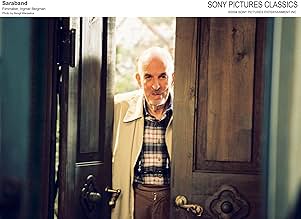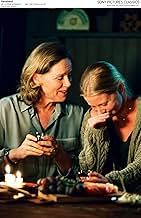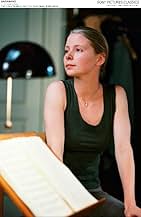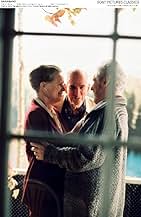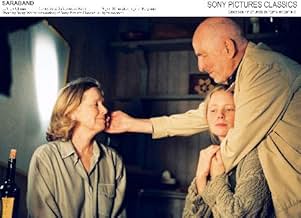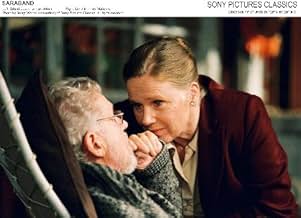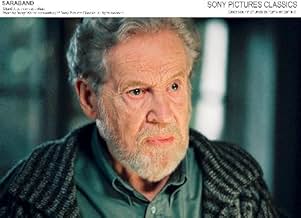Marianne, près de trente ans après avoir divorcé de Johan, décide de rendre visite à son ex-mari dans sa résidence d'été. Elle arrive en plein drame familial entre le fils de Johan d'un autr... Tout lireMarianne, près de trente ans après avoir divorcé de Johan, décide de rendre visite à son ex-mari dans sa résidence d'été. Elle arrive en plein drame familial entre le fils de Johan d'un autre mariage et sa petite-fille.Marianne, près de trente ans après avoir divorcé de Johan, décide de rendre visite à son ex-mari dans sa résidence d'été. Elle arrive en plein drame familial entre le fils de Johan d'un autre mariage et sa petite-fille.
- Réalisation
- Scénario
- Casting principal
- Récompenses
- 3 victoires et 3 nominations au total
Avis à la une
With an intolerable burden of the generations, a young woman must make a choice that may be tragic. There are no useful models, not even the briefly glimpsed folk-art carving of the Last Supper with John, the beloved disciple, blissful on the lap of Jesus, not law, Kierkegaard, whiskey, or Bach either.
It is regrettable if after all these years this is Bergman's "Tempest" (though then appropriately involving Erland Josephson--all the actors are necessarily extremely good). Shakespeare did go on to work on "The Two Noble Kinsman."
SVT could have given Bergman film instead of digital recording. RAI uses film for its splendid productions, or it used to. Seen in a theatre, the visual quality was imperfect. How could people think this work would not deserve general theatrical release?
Now, over 30 years later, I am in my living room once more watching Johan and Marianne. Only this time I don't need subtitles, as I have since learnt Swedish. :-)
Bergman weaves a tale of vindictive dependence and of a young girl's decision to finally make her own way in life - despite some very powerful forces preventing such a move.
Marianne decides to seek out Johan, meets him and becomes involved in the tug of war over his grand-daughter's future with the girl's father, Johan's depressed son Henrik (wonderfully played by Börje Ahlstedt).
A quiet, intensive film. With an important, pivotal roll for the grand-daughter Karin played by Julia Dufvenius.
Bergman should be proud of this. It's a fine epilogue to a marvelous career in cinema and story-telling.
Bravo!
Having said that it seems a strange twist of fate to be viewing Saraband, as I did, at the Edinburgh International Film Festival where it is up for the Standard Life 'audience award', along with mainstream crowd-pleasers. As I cast my vote I felt it was almost a desecration for such a movie to be entered in a popularity poll, however discerning the audience. There are a number of serious works at the Festival and they should be judged by an independent panel of experts - there is a discussion afoot to create a new award along these lines - otherwise it is like comparing Beethoven with the Beatles.
Saraband, in true Bergman tradition, wrestles with human relationships, using a slow pace, pointed dialogue, and heavy use of symbolism to explore the psychological states of the characters. Bergman encourages young directors not to direct any film that does not have a "message," but to wait until one comes along that does, yet admits himself that he is not always sure of the message of some of his films.
We are never in any doubt that this film has much point to it, even if the point is not exactly clear. It opens with the slow soulful 'saraband', of Bach's 5th unaccompanied cello suite. 'Sarabande' is one of the movements from the suite, a slow and, compared to the others, a relatively easy piece to play. Marianne (Liv Ullman), is both narrator (at the beginning and end of the film) and principal protagonist. As she walks through the rooms of a house the doors close behind her. A cuckoo clock strikes. She is in the later part of her life. She fleetingly touches the keys of a piano, as if to say she still, even in solitude, has her inner music. Her presence is explained as she goes to the veranda and we find she is visiting an ex-husband, someone who was unfaithful to her many years ago. The colours are crisp and sharp. Of all the members of her family, Marianne is perhaps the clearest of mind and most well-balanced, but it is the extended interaction (with very little action) between the main players that give us insights into the beauty of being elderly, at least for someone like Marianne who handles it well. Yet even she is filled with sadness for others.
Later chapters of the film focus on her step-grand-daughter. Karin is a cellist, living with a rather overprotective (if that's not too mild a word) father, also a musician. She has to face a difficult choice, involving her personal loyalties, her loyalty to herself and ability as a gifted young cellist, and the need to extricate herself from a situation that is bad for her but will be bad for her father if she does.
The symbolism of the title and music neatly metaphors the decisions before her. A saraband is also a two-person dance. The suggestion, made at one point, of playing it by two people alternating is essentially a frivolous one, which serious musicians would probably reject. That the Suite for Unaccompanied Cello should not be played as a duet, even with the younger person playing the 'easier part' as Karin's father suggests, is an unobtrusive symbol reminding us, in the film's later loaded context, that there are some lines that an older and younger person should never cross together.
Saraband shows how old age can tempt us to wisdom or its opposite.
"Saraband" for me is about as good as he gets...and that's high praise. Here the human soul in anguish is laid bare in all its honest need...a thwarted one...for love and understanding. A once married couple, Marianne and Johann (brilliantly portrayed by Liv Ullmann and Erland Josephson) do their saraband even after 30 years apart. And like that dance, in its repetitive themes, their relationship as well as that of Johann's son and granddaughter form a kind of tragic rondo, sadly and inexorably replicated. Henrik, the 61 year old son (portrayed with amazing profoundity by Borje Ahlstedt) cannot extricate himself from the slings and arrows aimed at him continually by his father. The one character, now dead, who serves as a graceful inspiration to them all is Henrik's wife and his daughter, Karin's mother...Anna. We see her beautiful face in a photographic portrait, but her loving presence in their memory is so strong it becomes a kind of living influence. Karin, played by the stunning Julia Dufvenius, is also the victim of the family dynamic and forms the important fourth in this saraband of life and fate.
Le saviez-vous
- AnecdotesLast film project directed by Ingmar Bergman.
- GaffesThere are some interesting discrepancies in relation to the time line of the characters. The ages given for the characters are 63 (Marianne), 86 (Johan) and 61 (Henrik). Marianne says that she has not seen Johan for 32 years and that they had been married for 16 years. This means that she married Johan when she was 15 and he was 38. Johan had a falling out with his son when Henrik was 18/19, which must have been after Johan's marriage to Marianne.
- Citations
Henrik: Dad, where does all this hostility come from?
Johan: Speak for yourself. When you were 18 or 19, I tried to get close to you. You'd been seriously ill, and your mother wanted us to talk things out. I said to you, "I know I've been a bad father, and I want to do better." And you screamed at me--yes, screamed--"A bad father? You've never been a father at all!" Then you said you could do without my forced exertions. One should respect honest hatred, and I respect yours. But I really couldn't care less if you hate me. You barely exist. If it weren't for Karin, who thank God takes after her mother, you wouldn't exist for me at all. So there's no hostility here, I assure you.
- ConnexionsFeatured in Bergman och filmen, Bergman och teatern, Bergman och Fårö (2004)
- Bandes originalesCello Suite no. 5 in C Minor, Movement 4: Saraband
Composed by Johann Sebastian Bach
Performed by Torleif Thedeen (as Thorleif Thedeen)
Meilleurs choix
- How long is Saraband?Alimenté par Alexa
Détails
- Date de sortie
- Pays d’origine
- Site officiel
- Langues
- Aussi connu sous le nom de
- Saraband
- Sociétés de production
- Voir plus de crédits d'entreprise sur IMDbPro
Box-office
- Montant brut aux États-Unis et au Canada
- 645 634 $US
- Week-end de sortie aux États-Unis et au Canada
- 34 304 $US
- 10 juil. 2005
- Montant brut mondial
- 975 181 $US
- Durée1 heure 47 minutes
- Couleur
- Mixage
Contribuer à cette page





